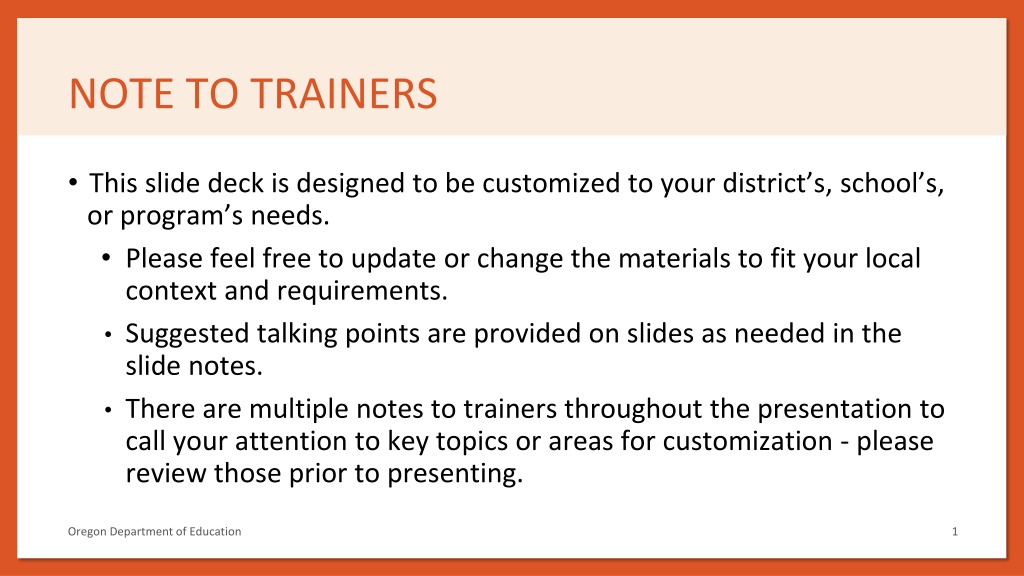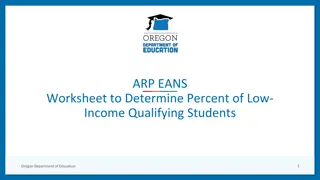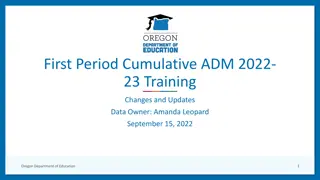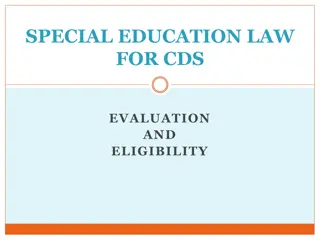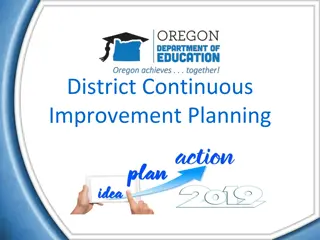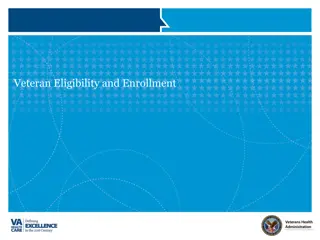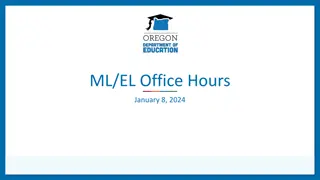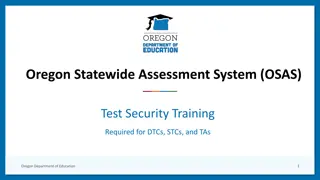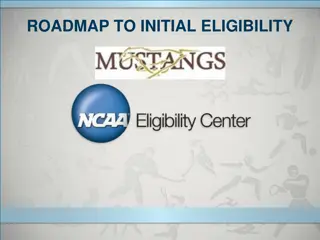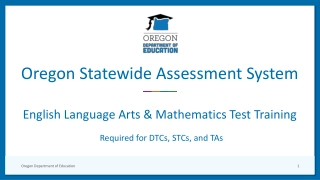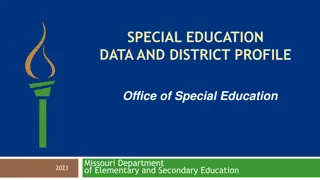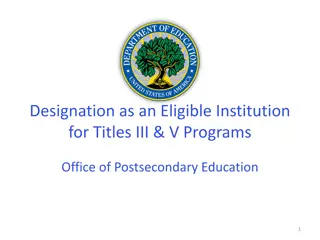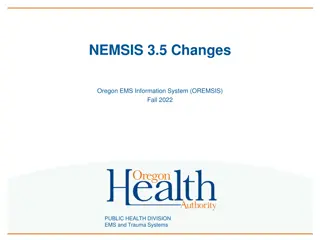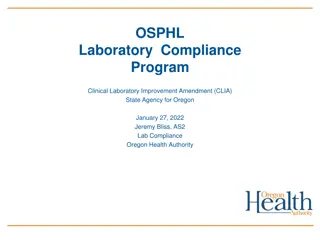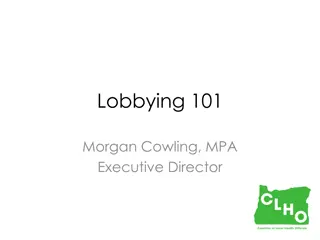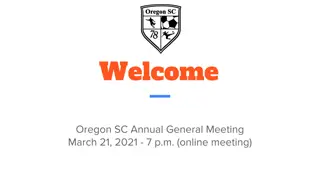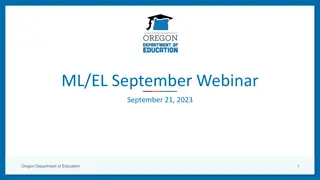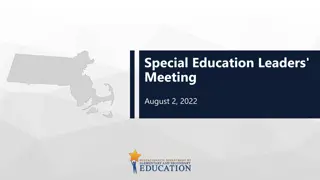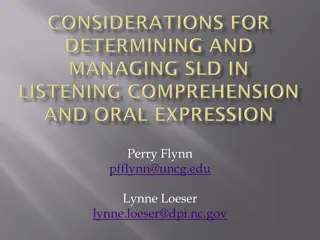Oregon Department of Education: Special Education Evaluation & Eligibility Updates
Updates to Oregon's Special Education Evaluation and Eligibility process, including changes mandated by Senate Bills 13 and 16 to improve accessibility, update eligibility categories, and integrate early intervention standards.
Download Presentation

Please find below an Image/Link to download the presentation.
The content on the website is provided AS IS for your information and personal use only. It may not be sold, licensed, or shared on other websites without obtaining consent from the author. Download presentation by click this link. If you encounter any issues during the download, it is possible that the publisher has removed the file from their server.
E N D
Presentation Transcript
NOTE TO TRAINERS This slide deck is designed to be customized to your district s, school s, or program s needs. Please feel free to update or change the materials to fit your local context and requirements. Suggested talking points are provided on slides as needed in the slide notes. There are multiple notes to trainers throughout the presentation to call your attention to key topics or areas for customization - please review those prior to presenting. Oregon Department of Education 1
Special Education Evaluation & Eligibility OAR Updates Oregon Department of Education 2
Optional slide for agenda Oregon Department of Education 3
Optional slide for introduction Oregon Department of Education 4
Background In 2019, the Oregon State Legislature passed Senate Bills (SB) 13 & 16. SB 13 mandated updates to the language included under the term child with a disability. SB 13 updates were designed to increase access by creating more inclusive and accessible terms for the updated eligibility categories. SB 16 mandated updates to the requirements for statements from healthcare providers as part of the eligibility process. SB 16 updates were designed to reduce barriers to eligibility by expanding the providers eligible to complete an examination as part of an eligibility process and to deemphasize the use of a specific form. Oregon Department of Education 5
Background Additional OAR revisions were included to provide a consistent format across all categories. These updates not only addressed legislative requirements, but also integrated early intervention and early childhood special education (EI/ECSE) eligibility and evaluation standards into the current school age OARs. Oregon Department of Education 6
Overview of Changes to Oregon Administrative Rules Oregon Department of Education 7
Overview of Changes Domain 1 Updates to eligibility category names Updates to the list of professionals that can complete medical examinations, vision examinations, and audiological assessments Reduced number of eligibility categories requiring medical examination Domain 2 Integrates early intervention (EI) & early childhood special education (ECSE) eligibility requirements into existing school age requirements Domain 3 Oregon Department of Education 8
Updates to Eligibility Category Names Speech or Language Impairment replaced Communication Disorder Emotional Behavior Disability replaced Emotional Disturbance Deaf or Hard of Hearing replaced Hearing Impairment Autism Spectrum Disorder replaced Autism Deafblindness replaced Deaf-Blindness Oregon Department of Education 9
Updated OAR Language: Medical Examination In the updated OARs, medical examination means an examination conducted by one of the professionals listed below: Physician licensed under ORS chapter 677 or by the appropriate authority in another state; Naturopathic Physician licensed under ORS chapter 685 or by the appropriate authority in another state; Nurse Practitioner licensed under ORS 678.375 to 678.390 or by the appropriate authority in another state; Physician Assistant licensed under ORS 677.505 to 677.525 or by the appropriate authority in another state. Oregon Department of Education 10
Updated Requirements for Audiological Assessments and Vision Examinations Audiological Assessment Vision Examination OARs now include an audiological assessment given by a licensed audiologist as a documentation option for a Deaf and Hard of Hearing evaluation and eligibility. OARs now include a vision examination given by a licensed optometrist or by a physician who specializes in ophthalmology to determine Visual Impairment eligibility. Oregon Department of Education 11
Documentation of a Medical Examination Documentation of a medical examination: is a form or other written documentation that is shared between an eligible medical provider and the district; may provide relevant information that assists in determining whether the child is a child with a disability; and can meet the medical examination requirement for initial and re-evaluations regardless of what form the documentation is provided in. Oregon Department of Education 12
Required Documentation of Medical Examination Listed below are the six instances of eligibility criteria that require documentation of a medical examination to determine eligibility: 1. Autism spectrum disorder (for ages birth - 5 years of age ONLY) 2. Child is suspected of having a voice disorder (category: speech or language impairment) 3. Deaf or hard of hearing (specific to a conductive hearing loss) 4. Other health impairment 5. Traumatic brain injury 6. Orthopedic impairment Oregon Department of Education 13
Documentation of Medical Examination is Required Autism spectrum disorder for a birth 5 years of age Documentation of a medical examination is required for children age birth to five for initial autism spectrum disorder eligibility determinations. For children older than 5, the team may require documentation of medical examination if the team determines it is necessary. A medical diagnosis of autism spectrum disorder continues to not be required to determine eligibility. Oregon Department of Education 14
Documentation of Medical Examination is Required Child is suspected of having a voice disorder (speech or language impairment): Documentation of a medical examination by otolaryngologist is required for a child suspected of having a voice disorder. For all other types of speech or language impairments, the team may require documentation of medical examination if the team determines it is necessary. Oregon Department of Education 15
Documentation of Medical Examination is Required Deaf or hard of hearing specific to a conductive hearing loss For conductive hearing loss, medical examination is required to document if the hearing loss is treatable. For sensorineural hearing loss, the team may require documentation of medical examination if the team determines it is necessary. Oregon Department of Education 16
Documentation of Medical Examination is Required Other health impairment Documentation of a medical examination indicating a diagnosis of a health impairment or a description of the impairment, and a statement that the child's condition is permanent or is expected to last for more than 60 calendar days is required for this category. Oregon Department of Education 17
Documentation of Medical Examination is Required Traumatic brain injury Documentation of a medical examination which identifies a traumatic brain injury is required for this category. Under specific circumstances, a guided credible history statement may be substituted for a medical examination for traumatic brain injury (OAR 581-015- 2175). Oregon Department of Education 18
Documentation of Medical Examination is Required Orthopedic impairment Documentation of a medical examination indicating a diagnosis of an orthopedic or neuromotor impairment or a description of the child s motor impairment is required for this category. Oregon Department of Education 19
Documentation of a Medical Examination May Be Required Emotional Behavior Disability Intellectual Disability The evaluation team may require documentation of a medical examination to determine whether there are any physical factors that may be affecting the child's educational performance. The evaluation team may require documentation of a medical examination if it is necessary to describe any relevant medical issues or any sensory or physical factors that may be affecting the child's educational performance. Oregon Department of Education 20
Documentation of a Medical Examination May Be Required Developmental Delay Autism Spectrum Disorder The evaluation team may require documentation of a medical examination to determine if there s a diagnosed physical or mental condition that has a high probability of resulting in developmental delay. For children older than 5, the team may require documentation of medical examination if the team determines it is necessary to ensure consideration of other health and/or physical factors that may impact the child s educational performance. Oregon Department of Education 21
Documentation of a Medical Examination May Be Required Speech or Language Impairment Specific Learning Disability For other than a voice disorder, the evaluation team may require documentation of a medical examination if relevant medical information is needed. The team may require documentation of medical examination indicating whether there are any physical factors that may be affecting the child s educational performance. Oregon Department of Education 22
Documentation of a Medical Examination: Required or Necessary? When documentation of a medical examination is not required as a part of the eligibility criteria, the evaluation team may still determine that medical examination documentation is necessary to determine if there is a condition or needs that may be affecting the child s educational performance. Oregon Department of Education 23
Frequently Asked Question Question: What should a team do if it is not possible to obtain documentation of a medical exam from a parent? Answer: The updates described today do not change a teams responsibility to collect documentation of a medical examination that is either required by OAR or determined necessary by the team. Teams should plan ahead and work proactively with the parent/guardian and/or with district resources to obtain the required documentation. Teams should be aware that extending an evaluation past the 60-day timeline due to a lack of required medical documentation is considered non-compliant. Teams should consider individual circumstances when determining the best course of action when nearing or past the 60-day deadline. Oregon Department of Education 24
Integration of Early Intervention and Early Childhood Special Education Evaluation and Eligibility Procedures Oregon Department of Education 25
Integration of Early Intervention and Early Childhood Special Education Evaluation and Eligibility Procedures In Oregon, special education eligibility is divided into three age ranges: Early Intervention (EI): birth to 3; Early Childhood Special Education (ECSE): 3 to 5; and School Age Special Education: 5 to 21. Oregon Department of Education 26
Integration of Early Intervention and Early Childhood Special Education Evaluation and Eligibility Procedures In the OARs for applicable eligibility categories, early intervention and early childhood special education (EI/ECSE) are included alongside school age special education to support: Oregon s seamless system for children and students who experience disabilities; IDEA Part B provisions and requirements which apply to children and students with disabilities ages 3 21; The full continuum of eligibility for each categorical disability; Coordinated kindergarten transition practices for children moving from early childhood programs into school. Oregon Department of Education 27
Integration of Early Intervention and Early Childhood Special Education Evaluation and Eligibility Procedures The updated OARs now include integrated early intervention, early childhood special education, and school age evaluation and eligibility procedures for the following shared eligibility categories: Oregon Department of Education 28
Example: Updated OARs with Integrated Evaluation and Eligibility Procedures Deaf and hard of hearing eligibility criteria: Oregon Department of Education 29
Example: Updated OARs with Integrated Evaluation and Eligibility Procedures Developmental delay eligibility determination: Oregon Department of Education 30
NOTE TO TRAINERS For districts that use ODE s sample form: continue to the next section to review updates that have been made to the sample eligibility forms. For districts that use their own eligibility forms: please insert that information in this section. Note: If district does not use ODE s sample forms, they should review their district s eligibility forms to ensure that their special education evaluation and eligibility procedures are in alignment with the requirements of the Individuals with Disabilities Education Act (IDEA) and Oregon Administrative Rules (OARs) for special education. Oregon Department of Education 31
Updates to ODEs Sample Eligibility Forms Oregon Department of Education 32
New Sample Eligibility Forms The Oregon Department of Education (ODE) developed new sample eligibility forms to provide guidance and support to districts in meeting their legal obligations and ensuring that students with disabilities receive appropriate services and supports. Reminder that ODE s sample eligibility forms are optional for use by districts. Sample eligibility forms are designed to ensure that districts' special education evaluation and eligibility procedures are in alignment with the requirements of the Individuals with Disabilities Education Act (IDEA) and Oregon Administrative Rules (OARs) for special education. Oregon Department of Education 33
ODEs Sample Eligibility Forms Each statement of eligibility form follows a format similar to the approved OARs and includes the following: requirements to complete a comprehensive evaluation for special education services; eligibility criteria specific to each disability category; and eligibility determination information. Oregon Department of Education 34
ODEs Sample Eligibility Forms : Comprehensive Evaluation Forms are updated to clarify the following: A comprehensive evaluation must be conducted regardless of the eligibility category. A comprehensive evaluation must include at least the required assessments that are detailed in the sample eligibility forms. *Teams are reminded that a comprehensive evaluation is driven by the student s strengths and needs, not by the disability category. Oregon Department of Education 35
ODEs Sample Eligibility Forms : Comprehensive Evaluation Example: Regardless of the eligibility category, ODE s sample form includes a statement to describe the need for a comprehensive evaluation and followed by required components of the evaluation necessary to determine eligibility. Oregon Department of Education 36
ODEs Sample Eligibility Forms : Medical Examination, Vision Examination and Audiological Assessment Example: the sample form for other health impairment eligibility includes the updated language and requirements for the documentation of a medical examination. Oregon Department of Education 37
ODEs Sample Eligibility Forms: Eligibility Criteria While no eligibility criteria have been changed as part of these updates, the language on the sample forms have been updated to reflect the specific eligibility criteria required to be eligible as a student within each disability category as defined under Oregon Administrative Rule. Oregon Department of Education 38
ODEs Sample Eligibility Forms: Eligibility Determination Regardless of the category, each sample form has an eligibility determination section for the evaluation team to determine the following: If the child s disability has an adverse impact on the child s educational performance; If the child meets the definition of a child with a disability under that specific category; and If the child needs special education or related services. Oregon Department of Education 39
ODEs Sample Eligibility Forms : Specific Learning Disability ODE s sample form for specific learning disability eligibility continues to provide options for both a response-to-intervention (RTI) model as well as a patterns of strengths and weaknesses model in evaluating and determining eligibility for special education. Oregon Department of Education 40
Eligibility Determination Guidance Oregon Department of Education 41
Eligibility Determination While OARs and ODE s sample eligibility forms have changed, eligibility criteria have not changed. This section of the presentation reviews eligibility determination as outlined in the new sample eligibility forms. Oregon Department of Education 42
Eligibility Determination & Special Education Each of the new eligibility forms includes a section for determining if a child requires special education, or requires specially designed instruction (34 C.F.R. 300.39(a)(1)). Specially designed instruction means adapting the content, methodology or delivery of instruction to address the unique needs of a child that result from the child s disability to ensure access of the child to the general education curriculum in order to meet the educational standards that apply to all children (34 C.F.R. 300.39(b)(3)(i), (ii)). If a child has a need for special education, the child has specific needs which are so unique as to require specially designed instruction in order to access the general education curriculum. Oregon Department of Education 43
Eligibility Determination & Special Education If the child only needs accommodations or modifications that do not require specially designed instruction or related services, the child does not qualify for special education. If a child meets the definition of a disability category but does not need special education and related services, the child will not be determined to be eligible for that specific eligibility category.** If the child has a need for special education and related services but does not meet the definition of a disability category, the child will not be determined to be eligible for that specific eligibility category. **If a child is found to have a disability, but does not need special education and related services, a referral for a 504 evaluation may be considered. Oregon Department of Education 44
Eligibility Determination & Special Factors IDEA and OARs are clear with regard to the fact that a child must NOT be determined to be a child with a disability if the determinant factor is one or more of the following: Lack of appropriate instruction in reading, including the essential components of reading instruction (defined in the Elementary and Secondary Education Act as phonemic awareness, phonics, vocabulary development, reading fluency including oral reading skills, and reading comprehension strategies);or Lack of appropriate instruction in math; or Limited English proficiency. Oregon Department of Education 45
Documentation of a Medical Examination Oregon Department of Education 46
Evaluation procedures should include a variety of assessment tools and strategies to gather functional, developmental, and academic information about the child (34 CFR 300.304, OAR 581-015-2110). Documentation of a Medical Examination Regardless of what format the documentation is provided, information obtained from a medical examination may provide data that assists the evaluation team in determining if the child is a child with a disability and the educational needs of the child. Oregon Department of Education 47
Examples of the types of documentation that a medical provider could provide: Documentation of a Medical Examination Medical history record Physician notes and progress reports Evaluation report Letters or reports from other eligible healthcare professionals involved in the child's care Oregon Department of Education 48
Documentation of a Medical Examination ODE has developed an optional form that can be provided to eligible medical professionals to document information from a medical examination. Oregon Department of Education 49
Documentation of a Medical Examination Regardless of its format, written documentation of a medical examination may provide information that will assist in determining whether the child is a child with a disability and should include at least the following: Child's name and date of birth. Any diagnosis or condition(s) that may be impacting the child's development or educational performance. Relevant information about the child's condition including expected length of duration of the condition. Exam and/or documentation date. Oregon Department of Education 50
